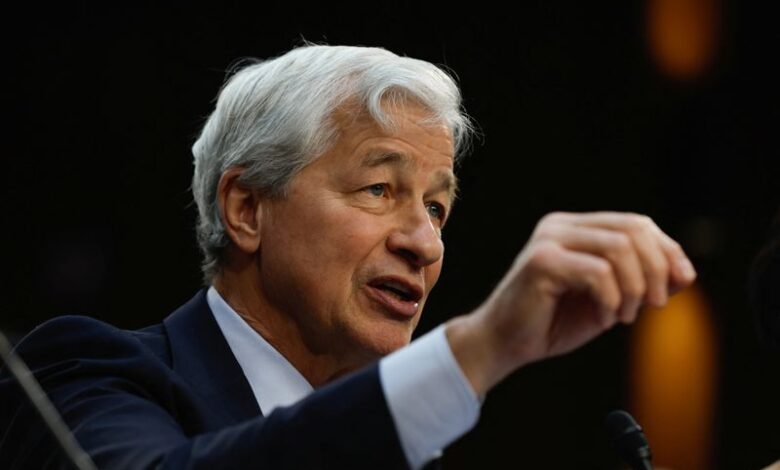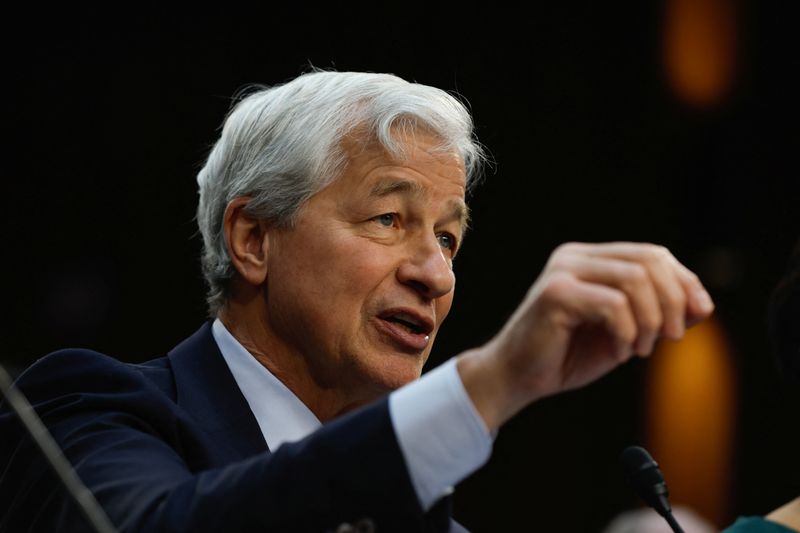Bank CEOs, huddled in private in Davos, worry about competition, economy


© Reuters. JPMorgan Chase CEO and Chairman Jamie Dimon gestures as he speaks during the U.S. Senate Banking, Housing and Urban Affairs Committee oversight hearing on Wall Street firms, on Capitol Hill in Washington, U.S., December 6, 2023. REUTERS/Evelyn Hockstein/F
By Stefania Spezzati and Megan Davies
DAVOS (Reuters) – Bank CEOs meeting in private at the World Economic Forum on Wednesday aired concerns about the competitive risks from fintech firms and private lenders, and complained about onerous regulations, a source familiar with the matter said.
At the meeting in Davos, attended by dozens of CEOs including JPMorgan Chase & Co. (NYSE:)’s Jamie Dimon, executives also discussed a challenging global economic picture, with shifting interest rate policies and rising debt, another person with knowledge of the meeting told Reuters.
Bank leaders were observed going into the meeting by Reuters. Before the meeting, at least one banking CEO told Reuters they see geopolitical risks potentially derailing interest rate cuts.
The private session was led by Barclays CEO C.S. Venkatakrishnan and Manulife CEO Roy Gori, according to a copy of the agenda seen by Reuters. The topics included navigating risk against a backdrop of geopolitical tension, macroeconomic uncertainty and technological disruption.
The pushback on regulation comes after Wall Street banks this week urged the U.S. Federal Reserve to completely overhaul a draft rule hiking bank capital, seeking to water down the “Basel Endgame” proposal that bankers say will hurt the economy.
UBS Chairman Colm Kelleher, speaking earlier in Davos, said regulators should focus on so-called shadow lenders that aren’t subject to the same rules and are more likely to cause the next crisis.
Bank failures in the United States and Europe in March reignited a debate about the risks lenders can pose to the financial system, even if capital buffers among tightly regulated lenders helped stem contagion fears.
Meanwhile, under a long-awaited move in the U.S., new regulations expected to be finalized this year should allow consumers to more easily transfer their data between financial services providers, which could prompt competition with financial technology firms.
There were about 60 CEOs of global financial firms including banks and insurance companies present, the first source said.
Among regulation concerns, UK supervisors were discussed by some as being particularly harsh, followed by European regulators, that source said.
Officials for JPMorgan didn’t have an immediate comment. Spokespeople for Barclays and Manulife couldn’t immediately be reached. Officials at the European Central Bank (ECB) and Britain’s Prudential Regulation Authority declined to comment.
The former chair of the ECB’s supervisory board said in September that the average capital requirements for banks deemed significant to the EU would be somewhat higher under U.S. rules.


